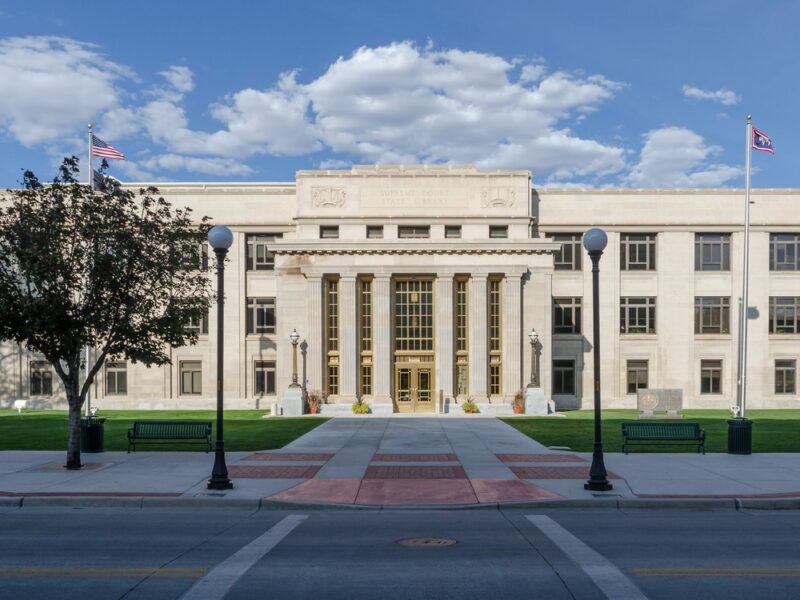BREAKING: Wyoming Supreme Court Declines to Weigh In on Abortion Questions
Abortion procedures remain legal in the state while the matter returns to the lower court
- Published In: Politics
- Last Updated: Dec 21, 2022

The Wyoming Supreme Court on Tuesday declined to weigh in on 12 questions about the constitutionality of the state's criminal abortion ban, sending the matter back to a lower court judge who had temporarily blocked the ban from going into effect previously. (Courtesy photo of Wyoming Supreme Court Building, © DXR, CC BY-SA 4.0)
By Jacob Gardenswartz
Special to the Wyoming Truth
This story has been updated.
The Wyoming Supreme Court on Tuesday declined to weigh in on questions about the constitutionality of Wyoming’s criminal abortion ban, sending the matter back to a lower court judge who had temporarily blocked the law from going into effect.
In a brief order signed by Chief Justice Kate Fox, the Court wrote that after “a careful review” of the questions before the justices, “this Court finds it should decline to answer the certified questions.”
“This Court does not believe it can answer all twelve certified questions on the limited factual record provided,” the note continued.
Late last month, Teton County District Court Judge Melissa Owens had certified the ongoing case to the Supreme Court, noting the dispute involved “questions of law which will be determinative of the cause and concerning which it appears there is no controlling precedent in the decisions of the Wyoming Supreme Court.”
Owens went on to enumerate 12 specific questions about HB 92, the law passed by state legislators earlier this year which imposed criminal penalties for abortion procedures. Among the questions were whether the law violated multiple provisions in the Wyoming Constitution, if it was “unconstitutionally vague” and if it violated Wyoming citizens’ right to privacy.
John Robinson, an attorney representing the plaintiffs seeking to get the law struck down, declined to comment on the Court’s decision. Representatives for the State of Wyoming did not immediately provide comment on the matter. As the party responsible for defending the abortion ban, the state had sought to have questions about its constitutionality answered by the Supreme Court before Owens issued her final decision.
With the Court declining to weigh in, the case now returns to Teton County District Court. In August, Owens temporarily blocked the ban from going into effect, pointing to “significant potential harms” the policy could impose both on individuals seeking abortions and doctors providing them.
In that opinion, Owens wrote that her analysis leading her to block the policy from taking effect applied only to the question of whether to grant a preliminary injunction. Still, she wrote that she believed plaintiffs “can likely succeed” in showing that the law is unconstitutional under two provisions.
It remains unclear what the next steps for the case will be. A representative for the Teton County District Court did not immediately respond to an inquiry about the timeline for hearings moving forward.
Regardless of Owens’ final decision, legal experts and parties on both sides of the issue have predicted the case will ultimately end up before the state Supreme Court. Even though it declined to weigh in on such questions at this time, the Court could still take up the case on appeal.
“I have little doubt, given the prominence of the abortion decision question currently, that the matter will eventually end up in the hands of the Wyoming Supreme Court,” Robert Keiter, a professor of law at the University of Utah who wrote a book on the history and interpretations of the Wyoming Constitution, told the Wyoming Truth earlier this year.
In an email on Wednesday, Keiter elaborated that it wasn’t unusual for the Court to wait to weigh in on the matter until after the lower court judge rendered her opinion.
“This will enable the Court to grasp the implications of the law and its enforcement, which will inform its interpretation of the constitutional provisions at issue,” Keiter said. “By declining to hear the case now and sending it back to the lower court, the Supreme Court will also have the benefit of the district court’s interpretation of the relevant Wyoming Constitution provisions when the case is appealed, as it almost certainly will be.”













